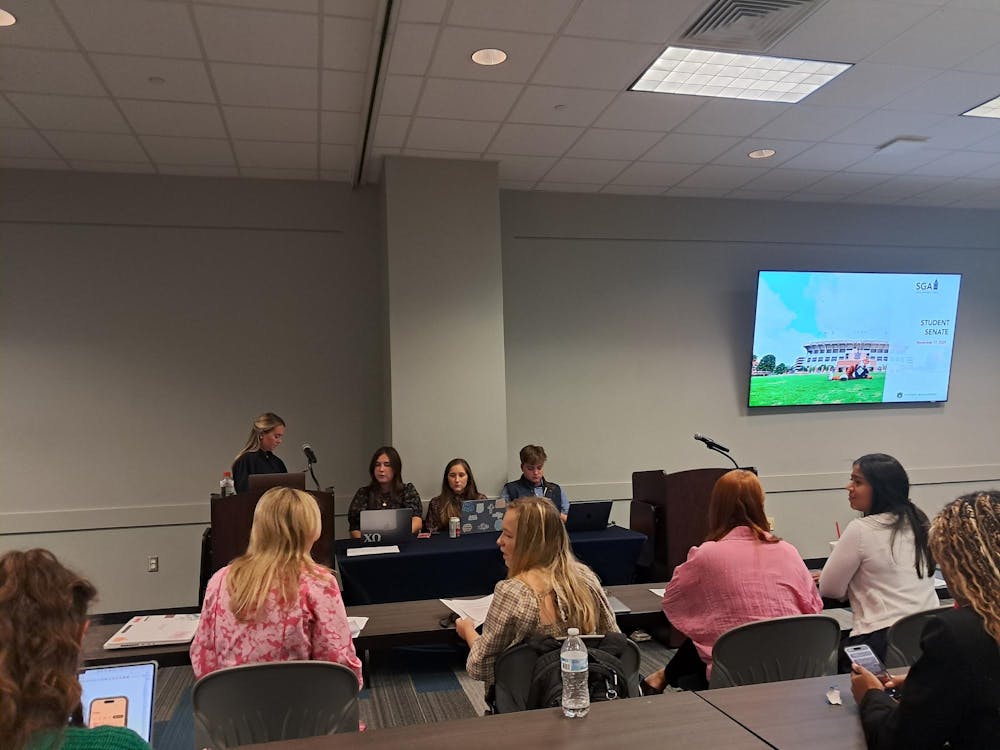On Nov. 17, SGA hosted its weekly senate meeting, with the order of business including a bill to remove student activity portfolios (SAPs), the addition of the university's anti-discrimination statement to the code of laws and AI recommendations for syllabi.
The bill was created by Lilly Pool, a member of the academic honesty committee, and McKenzie Steury, sophomore senator for the College of Veterinary Medicine.
SAPs were formerly a way of organizing student organizations on campus. Groups would be placed into either a governance, leadership or communication portfolio. With the passage of this bill, SAPs will no longer be used as the primary mode of managing student organizations. Buckley Nettles, SGA Vice President, explained the reason behind the removal of SAPs, sharing how its removal will make budgeting processes easier.
“So right now there is a governance, a service and a programming portfolio, so it’s just getting rid of those portfolios, which will make all of the finance budgeting processes a lot easier,” Nettles said.
When it comes to the effects of the bill, Steury believes that most will be seen through the basic structure of different organizations.
“The effects are mostly going to be as kind of an organizational method going forward. Right now, how it's happening is that there’s portfolios, which are organized into governance, leadership and communications portfolios. Those are going to be rid of,” Steury said. “These student activity organizations are not going to be organized into portfolios, rather they are going to be organized just by themselves.”
Before the passage of the bill, organizations like SGA, BSU and ISO were all considered to be in one governance portfolio. Since the passage of the bill, the different organizations will no longer be grouped together and will instead be their own activity organizations.
Another talking point of the meeting was the decision to change budgeting timelines. Instead of on-campus organizations submitting their budget for fall and spring semesters at once, organizations will now apply for their budget once per semester. Members hope that this and the removal of SAPs will make the budgeting process easier for these organizations.
Another aspect of the bill included the addition of Auburn’s anti-discrimination policy to the code of laws.
“We’re adding the university anti-discrimination policy to the code of laws. That will make sure everything we have that is from a SAG, all different forms of communication and advertising, has that statement at the bottom,” Steury said, “I think one really important part about this that might be helpful is that it shows that all of the organizations that are student activity funds must be open to all students.”
Not only was the University’s anti-discrimination policy added to the code of laws but the statement itself was altered to match the University’s changing policy.
“The anti-discrimination was changed from the Auburn level in their official documents, so we changed ours to reflect theirs,” Nettles said.
The meeting also discussed PSSR-25-1117-01, a bill titled "Recommendation for inclusion of a generative artificial intelligence statement in Auburn University course syllabi.” The bill was created by Giles Jones and Hope Holladay, senators for the college of engineering, and Hannah Congo and Copeland Brown, senators for the college of business.
The bill serves as a recommendation of ways to implement AI into syllabi at Auburn to ensure students know which ways they are allowed to use AI in the classroom.
“What this is doing is encouraging all professors to put a statement in there. It’s not a blanket statement – it has to say this. It’s more of like how a lot of students don't know how they can use AI in their courses,” Nettles said.
The bill also takes note of resources already available for faculty to assist with the implementation of AI into syllabi.
“The Biggio Center for the Enhancement of Teaching and Learning, the Provost Office and the Miller Writing Center provide guidance and resources for faculty, including optional sample generative AI statements within its syllabus template, to support clear communication of expectations.”
However, the bill explains that despite these resources, fewer than 10% of fall 2025 course syllabi made a mention of artificial intelligence.
Nettles explained the need for the bill, stating the varying policies on AI depending on the subject.
“I’m in a journalism class for example, and it’s not that AI is necessarily encouraged, but more like you can use it to harp on your ideas a little bit more,” Nettles said. “But then also other classes, it’s strictly prohibited.”
The order of business for the next senate meeting will be discussing the bill, PSSR-25-1117-01, further.
Do you like this story? The Plainsman doesn't accept money from tuition or student fees, and we don't charge a subscription fee. But you can donate to support The Plainsman.





